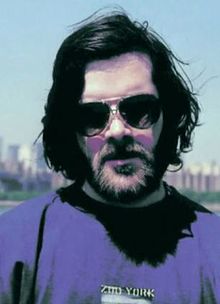Sam Houser (born 1972) is a British video game producer and developer. Sam Houser is the founder and president of Rockstar Games, as well the main creator and writer of the Grand Theft Auto video-games series, alongside his younger brother, Dan Houser.

NOT SAM HOUSER, ITS JOHN LENNON
Biography
Sam Houser was born in 1972 in England and grew up in London. His father ran a well known Jazz Club. Mr. Houser was a first generation video game enthusiast. During his early years he worked in the music business and worked for Bertelsmann Music Group (BMG). He went on to directing videos for BMG. When BMG decided to spin it off into an independent, New York–based company, Houser went with it.
Houser was in charge of finding and bringing to market new products for gaming systems like the popular PlayStation 2 and X–Box. One day, the first prototype for Grand Theft Auto arrived on his desk. It was the work of a Scottish game developer, DMA Design, and its carjacking premise intrigued Houser and his office-mates. An early version of Grand Theft Auto was released in Europe, where it became a cult favorite and gained a measure of bad press for its violent content. Yet BMG's Interactive division was about to tank, and so in 1998 Houser asked Donovan to join him in New York in order to launch their own company around Grand Theft Auto, which would be financed by a more established company called Take Two Interactive. They named their new venture Rockstar Games, and began releasing PlayStation games that lured a devoted following, including Smuggler's Run and Midnight Club Street Racing. Among denizens of New York City's Lower East Side and a subset of Silicon Alley tech–industry workers, Houser and Donovan became known for their "Rockstar" nights at bars and dance clubs that promoted their new releases. Grand Theft Auto III was released for the new, highly anticipated Sony PlayStation 2 system in 2001, and went on to become the best–selling title in the gaming industry that year. It had an aggressive theme and some choices could be construed as borderline sociopath: a player can choose to solicit and then rob a prostitute, or win extra points for carrying out a hit–and–run accident.
(who cares if there voilent)The prospect of pre–teens being exposed to such a world prompted a flurry of media coverage and even a political moment: the U.S. Senator from Connecticut, Joseph I. Lieberman, cited it as an example of the trend toward overly violent content in the entertainment industry in general. "Games like Grand Theft Auto are particularly troubling because they go beyond just celebrating violence generally, and actually reward players for engaging in organized crime, murdering innocent people, and other forms of perverse, antisocial behavior," the New York Times journalist John Leland quoted the senator as saying.
Houser and Donovan often pointed out that Grand Theft Auto III and its successful 2002 sequel, Grand Theft Auto: Vice City, were rated "M" for mature content, and thus advisable for sale only to those 17 and older. Vice City proved as successful as the first Grand Theft Auto, and sold a million copies in United States alone during its first week of release. The story is set in Miami during the mid–1980s, and positions the player as a low–level mobster trying to determine who may have stolen his contraband. "Other games may offer more killing and gore, but few are as ethically ambiguous," noted the New York Times 's Leland. In defense of the bad press, Houser said that he had met members of the New York City police department, and told the Guardian 's Poole that they had said they liked his game. "And I said, 'What about the fact that [the player can] kill cops?,'" he recounted, "and they said, 'Well, you know what? There's a lot of people out there trying to kill cops and we'd rather they did it in your game than on the street."' Despite the controversial content, Vice City landed on the short list for Britain's Designer of the Year competition, sponsored by the prestigious Design Museum. Its immersive world is rife with pitch–perfect period detail, including a choice of nine radio stations featuring various Eighties pop–music genres. Museum director Alice Rawsthorn told a writer for Design Week, Paul Murphy, that Vice City had made it onto the list of finalists "totally on its design merits. Visually and technically, in terms of the narrative it's much more complex than any other game—it is a genuine leap forward." Houser serves as president of Rockstar, and concentrates on product development, while Donovan handles the marketing work; Houser's brother, Dan, writes dialogue for the games. Their company's name, Houser noted, continues to reflect their goal—to deliver products with attitude. "At the end of the day you can't [mess] with Keith Richards," Houser explained in the Rolling Stone interview with Kushner. "You can't argue with Keith Moon riding down the street in a Rolls Royce.… That guy is the original punk rock. And if we can bring a fraction of a percent of that to games, then we're doing something."